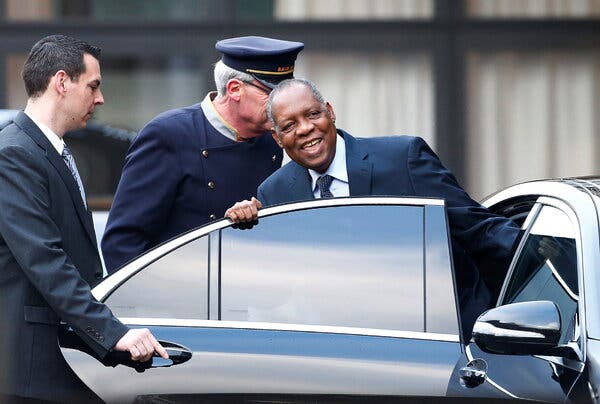Supported by
Issa Hayatou, ‘the Emperor of African Soccer,’ Dies at 77
In his posts atop the governing bodies for African and global soccer, he fought to establish the continent as an equal to Europe and South America.

Issa Hayatou, a savvy Cameroonian deal-maker who was hailed as “the emperor of African soccer,” leading its confederation for nearly 30 years and raising its international profile, including helping to steer the 2010 World Cup to South Africa, a first for the continent, died on Aug. 8 in Paris. He was 77.
His death, in a hospital during the Olympic Games, was announced by the Confederation of African Football, the governing body of African soccer. It did not cite a cause. He had been receiving kidney dialysis treatment for several years.
When Mr. Hayatou took over the confederation in 1988 — he would remain its president until 2017 — it was “an ossified organization that seemed far more concerned with internal power and privilege politics than the development of African football,” New African Magazine observed in 2017.
But, the magazine added, he soon “deployed his own substantial diplomatic and leadership skills and his wide contacts to move African soccer swiftly and surely out of the ghetto” and lead it “onto the world stage.”
Mr. Hayatou was a member of the International Olympic Committee for 15 years, starting in 2001, and later an honorary member. He was also a vice president of FIFA, global soccer’s governing body, and was its interim president from October 2015 to February 2016 following the resignation of the longstanding president Sepp Blatter amid a corruption scandal that led to the arrest of many FIFA officials.
Mr. Hayatou came from a family of authority figures. His father was a sultan in northern Cameroon, and his older brother, Sadou Hayatou, was briefly the country’s prime minister in the 1990s. As The New York Times wrote in 2017, Mr. Hayatou fit right in as “African soccer’s apparently unassailable kingpin.”
The Times noted his “combative style,” which “served the tall, heavily-built Mr. Hayatou well in African soccer, where a show of strength is often a successful tactic.” Mr. Blatter once said that Mr. Hayatou “does not look like a prince, more like a king.”
At times, his combative style took a defensive posture, as Mr. Hayatou withstood multiple accusations of corruption, although he was never proved guilty of any wrongdoing.
He was celebrated for his business acumen, directing billions in revenue to African soccer. During his presidency of the C.A.F., its coffers ballooned to roughly $130 million, from $1.25 million, according to the BBC.
Mr. Hayatou aimed to bring African soccer up to par with the European game, expanding regional club competitions as well as youth and women’s programs and doubling the number of teams in the finals of the Africa Cup of Nations, the continent’s main quadrennial soccer tournament, to 16, from 8.
During his years with FIFA, he not only fought to bring the World Cup to South Africa, but also increased Africa’s number of national teams in the tournament to five, from two, when the tournament expanded in 1998. That number grew to six in 2010 with South Africa’s automatic inclusion as the host country.
An ardent Pan-Africanist, Mr. Hayatou evoked the specter of colonialism when decrying the drain of top talent from his continent to the richer professional clubs of Europe.
“After the flight of brains, Africa is confronted with the muscle exodus,” he once said. “The rich countries import the raw material — talent — and they often send to the continent their less valuable technicians.”
“The inequality of the exchange terms is indisputable,” he continued. “It creates a situation of dependence and the impoverishment of some clubs — and of national championships.”
Issa Hayatou was born on Aug. 9, 1946, in Garoua, then part of French Cameroon. He was a standout athlete — as a soccer player, as member of the country’s national basketball team and as a national champion in the 400-meter and 800-meter running events.
In the 1970s, he served as a physical education and sports teacher at the Lycée Général-Leclerc, a secondary school in Yaoundé, the capital, and in 1982 was named Cameroon’s national sports director.
At times, Mr. Hayatou positioned himself as a crusader in an era when international soccer was swept up in scandal. As a vice-president of FIFA in 2002, he sought to unseat Mr. Blatter, who was being battered by accusations of illegal business practices and misuse of funds.
“I knew that there were things going wrong,” Mr. Hayatou was quoted as saying in The Times. “But the scope of the revelations that have been made is extremely troubling.”
Mr. Blatter denied all allegations and was re-elected by an overwhelming majority, remaining as president for another 13 years.
Mr. Hayatou himself was in the cross hairs of various accusations of ethical breaches.
In 2021, FIFA banned him for a year, accusing him of failing his fiduciary responsibilities to the C.A.F. when he had neglected to consider a rival bid in signing a $1 billion television and marketing deal with a French media company. The Court of Arbitration for Sport, an international body based in Lausanne, Switzerland, overturned the decision, citing a lack of evidence.
Mr. Hayatou, along with another African member of FIFA’s executive committee, was also accused of accepting $1.5 million in bribes to vote for Qatar as the World Cup host country in 2022. Mr. Hayatou denied the allegation. When pressed by a journalist on the matter, he responded: “You don’t know who I voted for. You cannot speculate on this. You aren’t even as old as my son.”
While he triumphed in the face of such accusations, some critics accused him of behaving less like a monarch than a dictator.
Mr. Hayatou faced calls for his ouster after he barred Togo’s team from the 2012 and 2014 Africa Cup of Nations, angry that Togo had pulled out of the 2010 tournament in Angola after gunmen from a local separatist group riddled the team bus with machine-gun fire as it crossed the border. The driver and two team officials were killed.
The ban was later overturned, but Mr. Hayatou remained unrepentant. The news media, he later told New African, “accused C.A.F. of being heartless.”
“We were accused of not protecting the team,” he said. “How could we have done that? C.A.F. has no army or police force. They were supposed to travel by air. But they traveled by road.”
Information about survivors was not immediately available.
Over the years, Mr. Hayatou expressed pride over the progress of African clubs at international tournaments during his tenure.
Cameroon’s team reached the quarterfinals in the 1990 World Cup; Senegal accomplished the same feat in 2002. The Nigerian men’s squad took home the gold medal in soccer at the 1996 Olympics, with Cameroon following suit in 2000.
“As a confederation, we are second only to Europe,” Mr. Hayatou said in an interview with The Los Angeles Times in the run-up to the 1994 World Cup. “There are at least 20 countries that play at a very good level — higher than teams from Asia, Oceania and Central America.”
“As far as South America is concerned,” he added, “there are only two countries, Argentina and Brazil, that are strong. The others are at the same level as those in Africa.”
Alex Williams is a Times reporter on the Obituaries desk. More about Alex Williams
Advertisement
